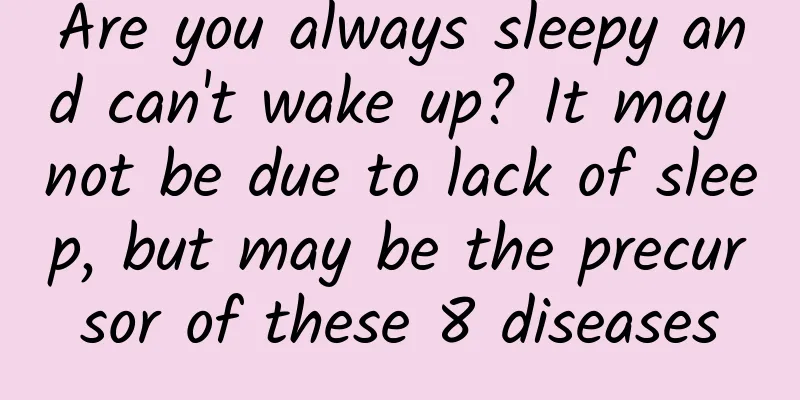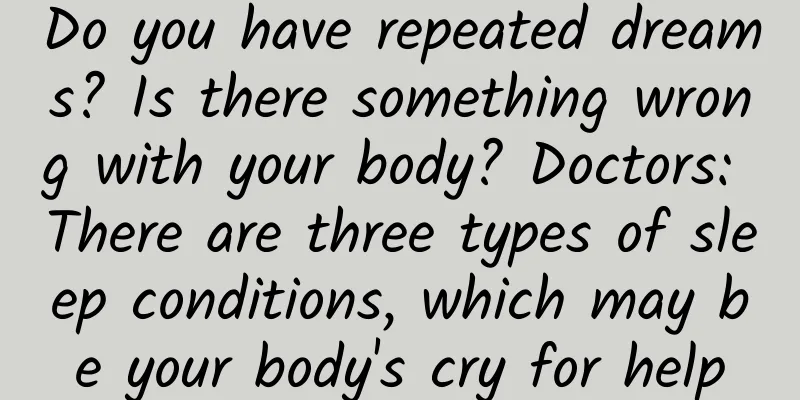Are you always sleepy and can't wake up? It may not be due to lack of sleep, but may be the precursor of these 8 diseases

|
As the saying goes, "You feel sleepy in spring, tired in autumn, and nappy in summer", but there is a kind of people who feel sleepy in all seasons. They don't want to get up in the morning, they fall asleep in class, they yawn all the time while driving, they have no energy at work, and they feel more and more sleepy during their lunch break... They are definitely "extremely poor students". "Doctor, I sleep seven or eight hours every night, but when I wake up in the morning I still have no energy at all. I still feel very sleepy and have no energy to work or study. What's going on?" This is the confusion that Mr. Zhao expressed during his visit to the doctor. Mr. Zhao came to see a doctor because he felt sleepy during the day, snored at night, and had high blood pressure, morning headaches and other discomforts. When he came to the doctor, he reported that he had dry mouth and frequent headaches in the morning and was easily sleepy during the day. In recent years, he had been lacking energy and easily forgetful. When he usually sleeps, he feels that his sleep quality is poor and he occasionally feels short of breath when sleeping. His family members reported that Mr. Zhao often snores at night and sometimes has long breathing pauses. Based on Mr. Zhao's condition, the doctor initially considered obstructive sleep apnea-hypopnea syndrome. A preliminary screening using the Epworth Sleepiness Scale and the STOP-BANG scale revealed an ESS score of 13 points, indicating a significant decrease in mental alertness; the STOP-BANG score was 4 points, indicating a high possibility of obstructive sleep apnea-hypopnea syndrome. The patient was recommended to be hospitalized for polysomnography. Monitoring confirmed that the sleep apnea-hypopnea index (AHI) was 47.6, the lowest blood oxygen saturation at night was 78%, and the average was 90%. Therefore, obstructive sleep apnea-hypopnea syndrome was diagnosed. After a clear diagnosis, the doctor developed a corresponding treatment plan for Mr. Zhao's condition. After adjusting his lifestyle and using a ventilator and blood pressure-lowering medication, Mr. Zhao's morning headaches and daytime drowsiness were significantly relieved, his snoring at night also disappeared, and his blood pressure was stabilized. Doctors remind that there are many reasons for drowsiness, which may be related to staying up late and lack of sleep at night. If you don't sleep when you should at night, and stay up late watching TV series, playing games, or pulling up all night, your brain will definitely protest and you will easily feel sleepy the next day. However, if you often feel sleepy and doze off during the day, you should be alert. This is not necessarily due to lack of sleep. It may be an "alarm" sent by the body, especially if this symptom persists and is not relieved. It is recommended to go to the hospital for treatment in time. Feeling sleepy during the day may be a precursor to these 8 diseases 01 anemia The most common and earliest symptoms of anemia are drowsiness and fatigue. Anemia refers to a decrease in red blood cells in the human body's peripheral blood. The main function of red blood cells is to carry oxygen from the lungs to various tissues and the brain. When the red blood cell value is lower than the lower limit of the normal range, oxygen cannot be fully supplied to tissues and organs, resulting in fatigue, drowsiness, pale complexion, etc. Generally speaking, mild anemia will not cause drowsiness. When the anemia is severe, the body's severe hypoxia can cause brain hypoxia, leading to drowsiness. Some patients may even experience headaches, palpitations, inability to move, etc., and the symptoms will be significantly aggravated after activity. Patients with anemia need to pay attention to rest more and take oral iron supplements as prescribed by the doctor to replenish blood and relieve anemia. 02 Hypoglycemia Hypoglycemia refers to a decrease in plasma glucose levels, which is often related to irregular diet, malnutrition, etc. In a state of hypoglycemia, patients may experience insufficient blood and oxygen supply to the brain, resulting in symptoms of sugar deficiency. In addition to feeling sleepy, symptoms may also include sweating, hunger, dizziness, palpitations, anxiety, irritability, and even coma. Patients are advised to eat in time to supplement sugar. In severe cases, blood sugar can be supplemented through intravenous glucose injection under the guidance of a doctor. 03 Cerebral ischemia Cerebral ischemia refers to an obstruction in the blood supply to the brain. Insufficient blood supply to the brain can hardly meet the metabolic needs of brain tissue, thus producing a series of symptoms, which are often related to underlying diseases such as hypertension and hyperlipidemia. Symptoms include headache, dizziness, drowsiness, fatigue, and even coma. In middle-aged and elderly patients, cerebral ischemia is often caused by atherosclerosis, while in young patients, most cerebral ischemia is caused by mental stress, irregular lifestyle, staying up late, anxiety, depression, etc. It is recommended that young patients should relax, reduce stress, exercise appropriately, and, if necessary, take oral nerve-regulating drugs as prescribed by the doctor to relieve symptoms. 04 Sleep apnea syndrome Sleep apnea syndrome refers to a series of clinical symptoms caused by respiratory arrest during sleep due to various reasons, which leads to hypoxia, hypercapnia, and sleep interruption. Daytime drowsiness and sleepiness are the most common symptoms of sleep apnea syndrome. It can also manifest as dizziness, fatigue, inattention, decreased memory and judgment, headache, and some patients may also experience decreased libido. Snoring is the main symptom at night. Many patients may also experience respiratory arrest, sudden awakening after the pause, as well as symptoms such as night sweating, auditory hallucinations, and night wandering. When this happens, it is recommended to see an ENT department promptly and perform sleep monitoring for further treatment. 05 Hypothyroidism Hypothyroidism, abbreviated as hypothyroidism, is a systemic hypometabolic syndrome caused by insufficient production of thyroid hormones or weakened action of thyroid hormones due to various reasons. Patients with low metabolism are usually prone to drowsiness, lethargy and other symptoms. Some patients may also experience chills, fatigue, dull expression, slow reaction, depression, dizziness, headache, mental and neurological abnormalities, and even coma. Patients are advised to seek timely treatment. 06 Heart disease A study published in the Journal of the American Heart Association reminds that taking naps for too long and too frequently during the day is associated with an increased risk of heart failure. Drowsiness is one of the more common clinical manifestations in patients with heart disease. Heart disease can cause reduced heart function, which in turn affects the blood circulation in the heart and throughout the body. When the heart's contraction and relaxation functions decrease, blood circulation disorders may occur, leading to disorders in the normal exchange of blood oxygen and carbon dioxide in the heart and lungs, and then disorders in the fresh blood perfusion of all important vital organs in the body. Therefore, when the blood oxygen in the cerebral arterial blood decreases, it may manifest as symptoms such as love of sleep, drowsiness, and sleepiness. In addition, the study also found that long or excessive daytime naps are also associated with an increased risk of heart failure in the future. Researchers believe that excessive daytime naps may be a preclinical manifestation of heart failure. 07 High cholesterol Usually, high blood lipids can hinder blood flow in the human body. When blood flow is not smooth, the oxygen-carrying capacity of red blood cells will be greatly reduced, causing symptoms of hypoxia in the body, especially the brain, which may cause patients to experience symptoms such as drowsiness, dizziness, and fatigue. 08 diabetes Diabetes is a group of metabolic diseases characterized by chronic hyperglycemia. Generally, the main manifestations are polydipsia, polyuria, polyphagia and weight loss. Drowsiness usually does not occur, but if blood sugar is not well controlled, drowsiness may occur. It is recommended that diabetic patients follow the doctor's advice to control their blood sugar to avoid blood sugar fluctuations that are not conducive to recovery. Kind tips If the drowsiness is caused by lack of sleep, you can drink a small amount of stimulating and refreshing drinks such as coffee and tea during the day, or listen to soft and soothing music to calm your mood. You can also reduce fatigue by massaging your temples, washing your face with cold water, etc., thereby alleviating drowsiness. We should also actively improve bad sleeping habits, maintain a regular schedule, and ensure adequate sleep every day, which can help the brain and body get adequate rest. If the drowsiness is caused by illness, it is recommended to seek medical attention promptly and take medication for the underlying disease. -END- |
<<: “Pull out one grey hair and 10 will grow back”, is it true?
Recommend
Why are most organisms "symmetrical"?
Today, the biodiversity of the earth is very rich...
Activity case: How to conduct fission activities through product thinking?
In the second half of the Internet , the user div...
Enjoy S9 starts at 399,800 yuan, equipped with a full version of Huawei N-piece set, Hongmeng Zhixing attacks the double 9 flagship
In July 2024, the sales volume of Hongmeng Zhixin...
Why did the ancestors of snakes go through so much trouble to evolve just to lose their legs?
Looking at all reptiles, snakes are a very specia...
Android performance optimization - detailed explanation of memory management explosion caused by OOM crash
[[414819]] Preface In app development, images are...
Hello "F9C22", warm welcome!
Sometimes diving to the bottom of the water, some...
How to leverage user motivation for growth?
Why do we who are engaged in growth need to pay a...
High-speed trains can reach speeds of up to 350 kilometers per hour, so why are there no seat belts?
Nowadays, people generally have a high level of s...
Guangzhou residents saw dolphins in the Pearl River! How did the dolphins get into the river?
Recently, a resident of Guangzhou City said that ...
Teacher Zhenhong's Ultimate Course: How I Make Money from Stock Trading, Make Stock Trading a Money-Making Skill
Teacher Zhenhong's Ultimate Course: How I Mak...
Bidding promotion: a universal method to improve bidding conversion rate!
There are many bidding issues, but in my opinion,...
What nutrients does umbilical cord blood contain?
When it comes to the source of nutrition for babi...
Swift AsyncThrowingStream and AsyncStream code examples
Preface AsyncThrowingStream and AsyncStream are p...
How to operate short video content well?
As the combined daily active users of Douyin and ...
Open the door quickly, the drone is here to deliver fresh seafood!
Nowadays, driven by the strategy of building a st...









![China Eastern Airlines Employees’ Fingertip Assistant [WeChat Enterprise Account Case]](/upload/images/67ebf28e47da9.webp)